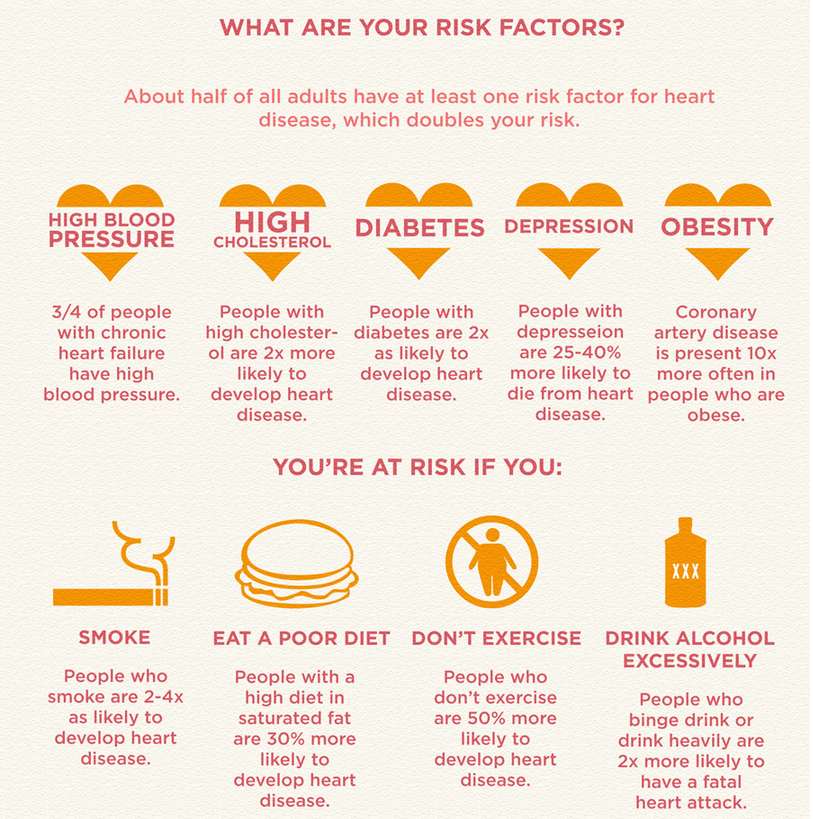Heart disease is typically thought of as an issue that mostly affects males, but in reality, it impacts women similarly and frequently takes a different type. Women have particular issues with heart health, even though males frequently develop heart disease earlier in life. Prevention and early detection rely on an understanding of these differences.
Heart Issues in Women
Heart disease includes a variety of illnesses associated with the heart such as coronary artery disease, heart attacks, heart failure, and arrhythmias. Compared to men, women may exhibit different signs and risk factors for heart disease. Awareness is important since this might cause delays in recognition and treatment.

Risk Factors Specific to Women
While both men and women are susceptible to the basic risk factors for cardiovascular disease such as high blood pressure, smoking, diabetes, and family history, some risks are more common or specific to women:
Hormonal Changes
After menopause, women’s estrogen levels decrease, which provides some protection against heart disease. The decrease in estrogen can cause increased cholesterol, higher blood pressure, and blood sugar fluctuations, all of which raise the risk of heart disease.
Pregnancy-Related Conditions
Women with conditions such as preeclampsia (high blood pressure during pregnancy), gestational diabetes, or a history of premature delivery may have a higher chance of developing heart disease later in life. These conditions may indicate underlying cardiovascular issues that require long-term monitoring.
Mental Health Factors
Women are more likely than men to report having depression, anxiety, or stress, and these emotional conditions have been connected to increased heart disease rates. Chronic stress can raise blood pressure and promote arterial inflammation, both of which increase the risk of heart disease.
Autoimmune Diseases
Certain autoimmune diseases, such as lupus and rheumatoid arthritis, are more common in women and can increase the risk of developing heart disease. These medical conditions frequently cause inflammation, which may damage the cardiovascular system.

Symptoms of Heart Disease in Women
One of the main challenges in diagnosing heart disease in women is that the symptoms can be different from those seen in men. While men often experience chest pain as the primary symptom, women may have more subtle signs, such as:
- Unusual fatigue
- Shortness of breath
- Dizziness or lightheadedness
- Nausea or indigestion
- Pain in the back, neck, or jaw
Because these symptoms are not immediately recognized as heart-related, women may not seek timely medical attention, which can delay diagnosis and treatment.
How to Prevent Heart Issues in Women
Regular monitoring and changes in lifestyle can help prevent heart issues. Women, in particular, should take the following measures to lower their risk:
Adopt a Healthy Diet
A well-balanced diet full of fruits and vegetables, whole grains, lean proteins, and healthy fats is essential. To reduce blood pressure and cholesterol, women should limit their diet of salt, saturated fats, and added sugars.
Exercise Regularly
Regular physical exercise may help in maintaining a healthy weight, reducing cholesterol, and managing blood pressure. The American Heart Association suggests at least 150 minutes of moderate-intensity aerobic activity or 75 minutes of vigorous-intensity activity per week.
Manage Stress
Mindfulness, yoga, and deep breathing exercises are examples of stress management practices that can help enhance the condition of the heart. Women should prioritize their mental health by getting counseling if they have signs of depression or anxiety.
Quit Smoking
Smoking is an important risk indicator for heart disease in both men and women. Quitting smoking instantly lowers your chance of having cardiovascular disorders, such as heart attacks and strokes.
Monitor Health Conditions
Regular checkups to monitor blood pressure, cholesterol, and blood sugar levels are important. Women with pregnancy-related issues should speak with their doctor about the condition of their hearts to minimize long-term risks.
The Importance of Regular Screening
Early diagnosis is necessary for avoiding heart issues in women. Women should have frequent cardiovascular exams, especially if they have risk factors including a family history of heart disease, diabetes, or high blood pressure. Additionally, keeping track of lifestyle changes and obtaining professional help can aid in efficient risk management.

For Your Information
Do you know if it angina or a heart attack? Learn to Recognize the Symptoms? Clik here and know some interesting facts
Conclusion
Heart issues is a serious health risk for women, but with knowledge and proactive actions, it may be effectively avoided and managed. Recognizing the specific symptoms and risk factors for women is essential for timely management. Women who follow a heart-healthy lifestyle and have regular medical check-ups can greatly lower their risk of heart disease and live longer, healthier lives.
FAQs
1. Can heart disease be prevented in women?
Yes, heart disease can be prevented by maintaining a healthy diet, exercising regularly, managing stress, quitting smoking, and monitoring health conditions such as high blood pressure and cholesterol.
2. What are the early signs of heart disease in women?
Women may experience unusual fatigue, shortness of breath, dizziness, nausea, and pain in areas such as the back, jaw, or neck. These symptoms can differ from the chest pain commonly experienced by men.
3. How does menopause affect heart health?
After menopause, the decline in estrogen can increase the risk of heart disease. Women may experience higher cholesterol levels, increased blood pressure, and changes in blood sugar levels that can contribute to heart problems.
4. Are women with autoimmune diseases at higher risk for heart disease?
Yes, conditions like lupus and rheumatoid arthritis, which are more common in women, can increase the risk of heart disease due to the inflammation they cause in the cardiovascular system.
5. How often should women get screened for heart disease?
Women should have regular screenings for blood pressure, cholesterol, and blood sugar levels, starting at least by age 40. Women with risk factors or a family history of heart disease may need to begin screening earlier.